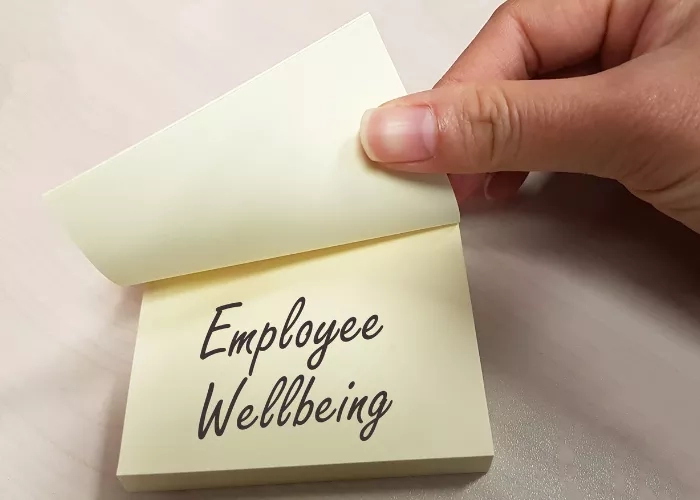As an event planner, are you being asked to do more with less? Is the pressure of deadlines and depleted teams causing your stress levels to rise? If so, you’re not alone.
Event planning has long been considered one of the world's most stressful professions. But in the aftermath of the pandemic, event professionals coping with talent shortages, high inflation, the need to learn new technology skills, and other daily pressures are at greater risk of mental health challenges such as burnout. But it doesn’t have to be this way.
Yes, event planning is a high-pressure career, but learning how to manage and reduce stress will safeguard against your employees either leaving or being off long-term sick. While for you as an individual, some simple steps to looking after your mental well-being will result in a happier, healthier outlook - both at work and at home.
In this article, we’ll look at ways to combat stress and avoid burnout while sharing some great tips from industry professionals along the way.
Recognising the signs of stress and burnout
In basic terms, burnout is an accumulation of stress. It’s a bell curve where stress levels increase and your performance declines in tandem. Burnout tends to be the point where someone’s performance has declined so much that they’re physically and mentally unable to function effectively anymore. So stress and burnout are intrinsically linked.
According to Laura Capell-Abra, a workplace well-being advocate and Founder of Stress Matters, recognising the signs that a prolonged buildup of stress may be putting someone at greater risk of burnout isn’t straightforward.
“Unfortunately, there’s no single set of signs since the way we all handle pressure and stress is different,” she says. “The way we describe it in our mental health training is that you’re looking for significant changes in an individual’s character.
“For some, this may manifest as tiredness due to lack of sleep. Others may overeat, drink too much, stop eating altogether or display some other kind of addictive behaviour. Some people grow quiet, become less punctual or they're slower in responding to requests,” she continues.
Although stress is generally considered to be the main prerequisite for workplace burnout, additional factors can also contribute. These include:
- Unfair treatment at work (e.g. overlooked for promotion, lack of flexible working, strict corporate policies)
- Disrupted home life (e.g. divorce, bereavement, parenting issues)
- Ongoing health issues (both pre-existing mental and physical)
- Personal pressures (e.g. financial, caring for a relative, childcare)
At Stress Matters, Capell-Abra encourages open and honest discussions about how staff are feeling. At a weekly catch-up meeting on a Friday, team members discuss more personal and home-life issues, which may be affecting their mood.
“As a team leader or manager, you need to be more in tune with colleagues, consciously listening and looking for signs of behavioural change,” she explains.
Once you’ve detected possible signs of burnout, there are a host of things that both businesses and team members can do to minimise risk and improve workplace wellness.
1. Define and set clear boundaries
As an events business leader, it's important to ensure team briefs are clear and well communicated and that client working agreements are in place. It will allow you to make better decisions based on employee wellbeing.
For instance, you should make clear that your team won’t be working onsite for longer than is considered healthy and instead, the client will be required to pay for shared job roles. Be clear on the policies that protect staff from burnout and ensure they are non-negotiable with clients.
As an individual, don’t let the industry’s long-held cultural expectations - always be available and always go ‘above and beyond’ - prevail.
Set your own personal boundaries so that you can step away from your work and reset your perspective.
2. Focus on individual strengths and delegate (if possible)
In the last few years, the role of an event planner has evolved. You've had to learn new technologies to execute hybrid events, plus better understand audience insights and develop new forms of content.
As roles and responsibilities increase, so too have stress levels, particularly among more junior staffers, who are less likely to feel empowered to push back or ask for additional support.
As a result, senior leaders need to recognise where the strengths lie within their teams and understand when a team member is struggling and needs help.
That help could come from suppliers as well as colleagues. By empowering individuals to lean on the expertise of others, they’ll be able to work to their strengths and feel more supported. This will help reduce the stress and anxiety associated with feeling out of your depth.
And if you’re a junior event planner, don’t be afraid to voice where you see your weaknesses and strengths in your role.
Any understanding manager or boss will help by providing additional training, mentoring or restructuring team responsibilities.
3. Take time to relax and unwind
You’re at a higher risk of burnout if you don’t take sufficient time to unwind, especially between events.
Resting doesn’t have to mean not doing anything, but it does require you to use your brain differently from when it’s in work mode. So have outside interests, embrace hobbies and give yourself the time and space to reset.
“I was brought up in a culture of ‘work hard, play hard,’ but no one ever told us to ‘rest hard’,” Capell-Abra continues. “You have to get good at resting and that can mean different things to different personalities. Some people rest by getting energised and going for a run or a gym workout. Others rest by being the energy and just sitting quietly, meditating or reading.”
4. Automate your systems and processes
When you need to do more with less, lean on technology to do a lot of the heavy lifting.
Project management tools like Asana and Trello can help you organise tasks, track progress, assign help when required, and have visibility over your team’s checklists.
Venue sourcing technology, meanwhile can automate laborious tasks such as sending out RFPs, shortlisting and generating reports.
And content creation tools can take the stress out of producing professional-looking videos, presentations, webinars and consistent designs with easy-to-use templates and dashboards.
One of the more stressful parts of an event is often when guests check in and receive their name badges. By making this process digital, you will relieve the pressures associated with finding and checking off names manually and act more sustainably by reducing paper and only printing badges for attendees as they arrive.
A single integrated tech stack will store and share data and insights on how your attendees engage with your content quickly and more effectively. The ability to assess delegate satisfaction and your event’s performance as it happens will save you from days of pouring over spreadsheets - providing you with some much-needed headspace after the event has finished.
5. Stay organised
In an industry as fast-paced as events, managing your time wisely and staying organised is critical.
Don’t always focus on the easy-to-hit deadlines first. The growing sense of anxiety at leaving more difficult tasks until last will contribute to heightened stress levels.
Plan a more difficult task between two easy ones so that you give yourself time to recuperate after a more challenging part of your day. And use a planning checklist to visualise how much time is required for each task so that you can work to achievable deadlines and ask for support if required.
Sarah Payne, a freelance event project manager with over 20 years of experience, says that prioritising is the key to staying organised.
She says: “Prioritise tasks so that every morning you have a to-do list that can be checked off throughout the day. There’s no greater sense of achievement than reaching the end of a day and seeing those tasks marked off - it’s really good for the mind and releases any built-up stress.”
Staying organised will also allow you to build time in for non-work activities, lunch breaks and periods throughout the week when you can practice self-care.
“Prioritising time for you is just as important,” says Payne.
6. Make sure your team is supported too
Stress is contagious – so the chances are that if you’re struggling with stress, other members of your team will be too.
Fortunately, there are ways that you can improve your team’s morale and reduce the stress of working in a high-pressure environment.
Ways to improve team morale include:
- Recognising and rewarding hard work by celebrating even small wins
- Avoiding micromanagement and empowering team members to work to their strengths
- Making team activities a priority to encourage togetherness
- Introducing workplace wellness initiatives such as quiet rooms, lunchtime yoga classes or communal play areas
- Having regular catchups to create a more open and honest workplace culture
- Providing workplace incentives such as gym membership, sabbaticals, pension etc.
Remember: Help is out there
The key thing to remember when battling stress to avoid burnout is that you’re not alone and there is plenty of expert advice, along with available resources that will help you to implement effective workplace well-being measures.
There will always be pressures in the planning and staging of events, due to it being a very deadline-orientated sector, but we need to remove the cultural acceptance that stress in event management is inevitable.
Let’s work together to ensure that no more industry talent is lost to burnout.
Mental health and well-being are two important considerations for event planners in 2023. For more information on this and other key trends shaping the future of the events industry, download our infographic, 9 Event Trends You Should Know in 2023.









